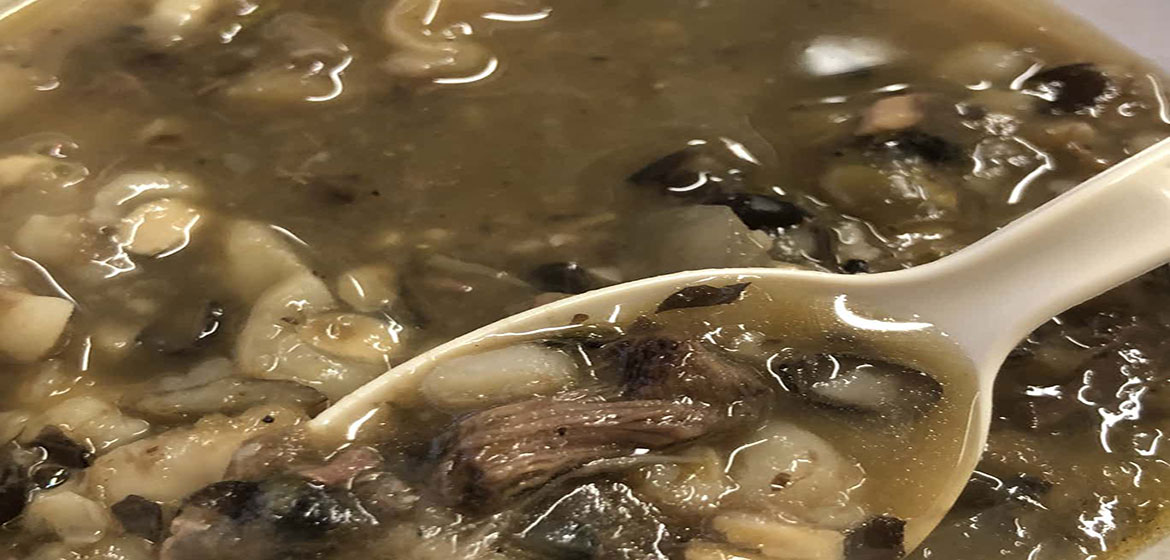by C.A. Printup
Despite the weather and a few frozen noses, Indigenous food brought hundreds of strangers together with stories, food, and laughter
“The secret of life is the give and take and barter.” This was among the many other bits and pieces of wisdom that were given out along with the food during the 2019 Great Lakes Intertribal Food Summit hosted by the Pokagon Band of Potawatomi Indians, Michigan & Indiana. The event took place from Thursday, March 25th till Sunday, March 28th.

The Great Lakes Intertribal Food Summit is a regional conference that hosts a variety of workshops, activities, and breakfast, lunch and dinner for attendees. These meals use ingredients that are naturally found in North America - so this means no fry bread.

Dinner for Saturday night. It included wild rice, romaine salad, breaded fish, a buffalo meat tamale, among other foods. (Photo by: C.A. Printup)
The event attracts people from all over the United States and Canada as demonstrated by a lot full of vehicles with plates all the way from Ontario, Canada. Though Saturday in the Great Lakes region not only saw a lot of rain that day, but snow, many of the attendees ran the to heaters, many still stayed outdoors, nestled under the blankets shuffling from vendor to vendor who did what they could to stay warm.

The line for dinner wrapped around multiple tables and didn’t let up for a full hour. (Photo by: C.A. Printup)
While the Great Lakes Intertribal Food Summit is mostly a food event, there were still multiple vendors that sold beadwork, art, tv shirts, and smaller niche food market items like wedding hot sauce and tribal made maple syrup and sugar.

Bottles of tribal-made maple syrup cover Ziibimijwang’s booth at the Intertribal Food Summit. (Photo by C.A. Printup).
Vendor Cyndee Fox-Starr, Odawa and Omaha, of shared that this was her second Food Summit that she had been to and that she would “like to see more Native communities hosting events like this and to see it nationally.” , a Corn Story Teller in the western Great Lakes area, agreed, stating “I’d like to see a heck of a lot more people attend... I would like to see more people take the knowledge and make a difference in their community.”

Gladys, the mannequin, Barbara Whitehead O’Rourke, and Cyndee Fox-Starr in their booth “Fox Way Designs” where they sell “Native business attire.” <em> (Photo by C.A. Printup).</em>
Even with the rain and snow being present, people kept a jovial spirit and shared stories from their tribes. Stories included why most tribes point with their lips and why gifting items such as corn and tobacco to those they just met were significant.
“Our people didn’t use money,” an Anishinaabe man explained in passing about the importance of bartering, “we knew better before colonization.”
Everyone had retreated into the pavilion by dinnertime, which became a safe haven from the snow, as it was enclosed with multiple heaters. Children sat near the front doing arts and crafts to pass the time, while the adults sat around, mingled and some also finished the elm basket weaving workshop enjoying the warmth.
A prayer was said once the food was laid out and Native chef, Sam Anglin said “I got choked up seeing all these people here for the same reason.”

Shaina Snyder (foreground) attends an elm bark basket making that was moved into the main dining tent due to the weather Saturday evening. (Photo by C.A. Printup)
Elders and people with small children got in line first to take food which included tamales with buffalo and beaver meat, wild rice, romaine lettuce with vinaigrette and sunflower seeds, white fish, and breaded fish.
Despite the weather and a few frozen noses, Indigenous food brought hundreds of strangers together with stories, food, and laughter, with many sharing on Facebook and Twitter about the fun they had.
“I had such an unforgettable time these past few days!” Elena Terry. “I’m so grateful for everything 💖 All the knowledge, inspiring conversations, encouragement, kindness and friendships that happened throughout the summit really lifted our spirits. This is such a beautiful way to bring our relatives together. Sharing teachings that will continue through generations while creating a stronger indigenous community, is priceless.”
Source:
Related to SDG 10: Reduced inequalities and SDG 3: Good health and well-being



